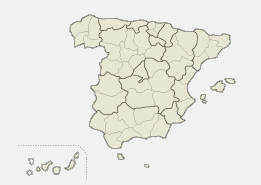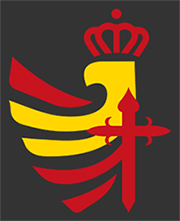- Home
- 'Boletín Tierra' Newspaper Reports
- One Hundred Years of “Regular” Spirit
One Hundred Years of “Regular” Spirit
Friday, July 1, 2011
Number: 1005
Ceuta and Melilla celebrate the centenary of the creation of the “Regulares”
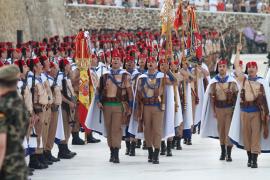
Tribute ceremony to the fallen
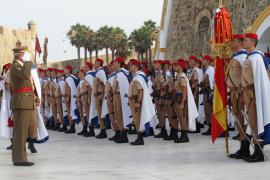
The Chief of the Army Staff salutes the Spanish
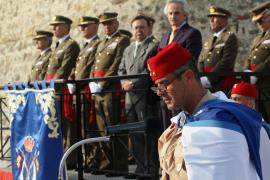
Colonel Faura gave an address
The “Regulares” units, the most decorated of the Army, yesterday celebrated their grand day, the centenary of their creation. It was on 30th June 1911 when the then minister of War, Mr. Agustín Luque, signed Royal Circular Order no. 127. Through this, by order of King Alfonso XIII, the so-called Melilla Indigenous “Regulares” Forces were created, the origin of the present day 54th Ceuta “Regulares” Group and the 42nd Melilla “Regulares” Group. The bravery and heroism shown by these troops throughout their one hundred year history in made patent by the nearly 90,000 casualties suffered, among deaths, injuries and missing in action.
Commemorative ceremonies were held simultaneously in Ceuta and Melilla, and were respectively presided over by the Chief of the Army Staff, Army General Fulgencio Coll, and the commander of the Land Force, Lieutenant General Virgilio Sañudo.
In the case of Ceuta, the Chief of the Army Staff went to Base "González Tablas", where he held an encounter with nearly one hundred former indigenous “regulares” who had travelled from Morocco. The secretary general of the National Association of Former Combatants, Mr. El Amine Rqibate, highlighted Spanish-Moroccan friendship and remembered the “love and affection” that the indigenous “regulares” feel for Spain, “which they always served with honour and loyalty”. In turn, the Chief of the Army Staff expressed gratitude for “their magnificent service throughout many years, given in an exemplary manner”.
Subsequently, there was a military parade just by the Royal Walls. The formation was integrated by five companies from the 54th “Regulares” Group and a squadron form the 3rd Armoured Cavalry Regiment “Montesa” (originally, the Indigenous “Regulares” Forces were Infantry and Cavalry units). The ceremony, also presided over by the Chief of the Army Staff, was attended by the autonomous city’s main civilian and military authorities, headed by its president, Mr. Juan Jesús Vivas, the Government delegate to Ceuta, Mr. José Fernández, and the commander general of Ceuta, General Ramón Martín-Ambrosio.
In his address, the commander of the 54th “Regulars” Group, Colonel José Faura, affirmed, “Today the Group is in formation to commemorate the one hundred year anniversary of the publication of the decree of its creation. Then, as today, we were agile, ready for combat on difficult terrain, standing with our equipment on our back. So we were in our beginnings, so we are now, and so we will be in the future”. As well, he praised the “regular” spirit, which is based on rigorous “technical, physical and moral preparation, with special attention to its cadre’s leadership, devotion to bravery and unit cohesion. This formula made giants of the “Regulares”".
Gold Medal of Melilla
The ceremony held in Melilla took place on Base "Alfonso XIII", where Lieutenant General Sañudo was received. Also attending were the autonomous city’s president, Mr. Juan José Imbroda, the Government delegate to Melilla, Mr. Antonio María Claret, and the general commander of Melilla, General César Muro.
On such a special day as this, the 52nd “Regulares” group was presented the Gold Medal of the Autonomous City, which the president awarded the unit’s Colour. In turn, the Group commander, Colonel Martín Cabrera, addressed the public –among whom were some relatives of its founder, Mr. Dámaso Berenguer-. In his speech he remembered the unit’s glorious past: “All of us, present members of this “Regulares” Group, are the fortunate trustees of this glorious background, which was won in combat by our predecessors at the post, “Regulares” soldiers who, as today, Spanish or foreign, side by side, served together under a single Flag, the Flag of Spain.
ARMY UNITS
- Araba Álava |
- Albacete |
- Alicante |
- Almería |
- Asturias |
- Ávila |
- Badajoz |
- Barcelona |
- Burgos |
- Cáceres |
- Cádiz |
- Cantabria |
- Castellón |
- Ceuta |
- Ciudad Real |
- Córdoba |
- A Coruña |
- Cuenca |
- Girona |
- Granada |
- Guadalajara |
- Gipuzkoa |
- Huelva |
- Huesca |
- Islas Baleares |
- Jaén |
- León |
- Lleida |
- Lugo |
- Madrid |
- Málaga |
- Melilla |
- Murcia |
- Navarra |
- Ourense |
- Palencia |
- Las Palmas |
- Pontevedra |
- La Rioja |
- Salamanca |
- Segovia |
- Sevilla |
- Soria |
- Tarragona |
- Santa Cruz de Tenerife |
- Teruel |
- Toledo |
- Valencia |
- Valladolid |
- Bizkaia |
- Zamora |
- Zaragoza
